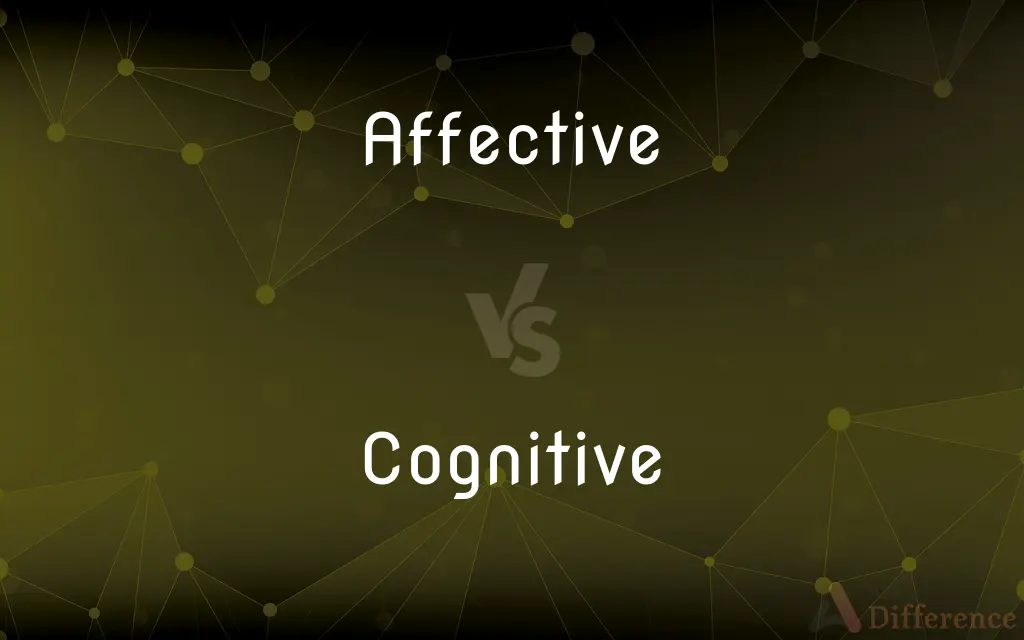Affective vs. Cognitive — What's the Difference?
By Fiza Rafique & Urooj Arif — Updated on March 20, 2024
Affective refers to emotions and feelings, impacting mood and attitudes, while cognitive relates to mental processes like thinking, learning, and problem-solving, influencing knowledge and understanding.

Difference Between Affective and Cognitive
Table of Contents
ADVERTISEMENT
Key Differences
The affective domain encompasses the aspects of emotional response, feelings, values, and attitudes of an individual. It is concerned with how we feel, both internally and in reaction to external stimuli. This includes a wide range of emotional experiences, from simple liking or disliking something to more complex states such as love, anger, or empathy. On the other hand, the cognitive domain involves the brain's processes for handling information, encompassing perception, memory, judgment, and reasoning. It is about how we think, understand, and process the world around us. Cognitive abilities enable us to solve problems, make decisions, learn new concepts, and recall memories.
While affective responses can be immediate and often subconscious, reflecting our emotional state, cognitive processes are more deliberate, involving conscious intellectual activity. For example, one's affective response to a piece of music might be instant happiness or sadness, whereas the cognitive interpretation would involve analyzing the lyrics, melody, or harmony.
It's important to note that affective and cognitive domains are interconnected. Emotions can influence cognitive processes; for example, a positive mood can enhance creative thinking or problem-solving. Conversely, cognitive activities can impact our emotions; for instance, thinking about a happy memory can elevate our mood.
In various fields such as education, psychology, and user experience design, understanding the distinction and interplay between affective and cognitive components is crucial. It helps in designing better learning environments, understanding human behavior, and creating products or services that cater to both the emotional and intellectual needs of individuals.
Comparison Chart
Definition
Relating to emotions, feelings, and moods.
Relating to mental processes like thinking and learning.
ADVERTISEMENT
Focus
Emotional responses and attitudes.
Information processing and knowledge acquisition.
Examples
Joy from music, frustration in traffic.
Problem-solving, decision-making, memorization.
Influence
Can impact mood and behavior based on feelings.
Shapes understanding, reasoning, and intellectual growth.
Interconnection
Affective states can influence cognitive abilities.
Cognitive processes can impact emotional responses.
Compare with Definitions
Affective
Affective pertains to feelings and emotions.
Her affective response to the movie was intense, leaving her in tears.
Cognitive
Cognitive relates to mental processes of understanding.
Cognitive skills like analysis and synthesis were tested in the exam.
Affective
Affective traits influence personal attitudes.
His positive affective disposition makes him popular among his peers.
Cognitive
It involves aspects of thinking and reasoning.
Her cognitive approach to problem-solving is both methodical and creative.
Affective
Affective learning encompasses values and emotional development.
Affective education aims to foster empathy and emotional intelligence.
Cognitive
Memory and perception are cognitive functions.
Cognitive decline in older can affect memory and perception.
Affective
It involves how we emotionally relate to experiences.
The affective impact of the charity event motivated him to volunteer.
Cognitive
Cognitive therapy addresses patterns of thought.
Cognitive behavioral therapy helps in restructuring negative thought patterns.
Affective
Emotions in the affective domain can drive behavior.
Affective reactions to criticism can range from acceptance to defensiveness.
Cognitive
Cognitive development focuses on intellectual growth.
Play-based learning supports children's cognitive development.
Affective
Influenced by or resulting from the emotions
Affective gestures and facial expressions.
Cognitive
Of, characterized by, involving, or relating to cognition
"For the person experiencing cognitive decline, the slow loss of coherent speech will be compounded by a declining ability to draw conclusions" (Joanne Koenig Coste).
Affective
Concerned with or arousing feelings or emotions; emotional
Affective therapy.
Cognitive
Relating to the part of mental functions that deals with logic, as opposed to affective which deals with emotions.
Affective
Relating to, resulting from, or influenced by the emotions.
Cognitive
Intellectual.
Affective
Emotional; emotionally charged; affecting.
Cognitive
Cognate; which is to be recognized as cognate.
Affective
Tending to affect; affecting.
Cognitive
Cognate.
Affective
Pertaining to or exciting emotion; affectional; emotional.
Cognitive
Knowing, or apprehending by the understanding; as, cognitive power.
Affective
Characterized by emotion
Cognitive
Of or being or relating to or involving cognition;
Cognitive psychology
Cognitive style
Common Curiosities
What is the affective domain?
The affective domain encompasses emotional aspects of human experience, including feelings, values, and emotional responses.
Is the affective domain important in education?
Absolutely, the affective domain is crucial in education for developing students' attitudes, values, and emotional intelligence, alongside cognitive skills.
Can cognitive strategies improve emotional well-being?
Yes, cognitive strategies, such as those used in cognitive-behavioral therapy, can significantly improve emotional well-being by changing thought patterns.
How do affective responses influence learning?
Affective responses can greatly influence learning by impacting motivation, engagement, and the emotional connection to the material.
How can one strengthen their cognitive skills?
Cognitive skills can be strengthened through activities like learning new things, brain exercises, puzzles, and maintaining a healthy lifestyle.
What does cognitive mean?
Cognitive refers to mental processes related to knowledge, understanding, thought, and reasoning.
What impact does stress have on cognitive functions?
Stress can impair cognitive functions, particularly memory and executive functions, due to the diversion of resources to deal with the stressor.
Can enhancing affective experiences improve user engagement?
Yes, enhancing affective experiences, such as through appealing design or emotionally resonant content, can significantly improve user engagement.
How do affective factors influence consumer behavior?
Affective factors, like emotions and attitudes towards a brand or product, can greatly influence consumer preferences and purchasing decisions.
Can emotions affect decision-making?
Emotions can significantly affect decision-making, sometimes leading to impulsive or biased choices influenced by current feelings.
What role does the cognitive domain play in problem-solving?
The cognitive domain is central to problem-solving, involving logical reasoning, pattern recognition, and the application of knowledge.
How is the affective domain assessed?
The affective domain is assessed through observations of behavior, self-reports of feelings, and evaluations of attitudes and values.
What cognitive functions are involved in learning a new language?
Learning a new language involves various cognitive functions including memory, phonological processing, and executive functions like switching attention.
Are affective and cognitive processes independent?
While distinct, affective and cognitive processes often interact, with emotions influencing cognition and vice versa.
Share Your Discovery

Previous Comparison
Clam vs. Cockle
Next Comparison
Costume vs. SuiteAuthor Spotlight
Written by
Fiza RafiqueFiza Rafique is a skilled content writer at AskDifference.com, where she meticulously refines and enhances written pieces. Drawing from her vast editorial expertise, Fiza ensures clarity, accuracy, and precision in every article. Passionate about language, she continually seeks to elevate the quality of content for readers worldwide.
Co-written by
Urooj ArifUrooj is a skilled content writer at Ask Difference, known for her exceptional ability to simplify complex topics into engaging and informative content. With a passion for research and a flair for clear, concise writing, she consistently delivers articles that resonate with our diverse audience.














































